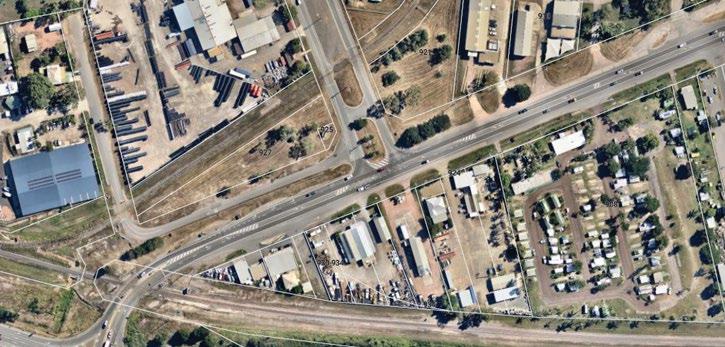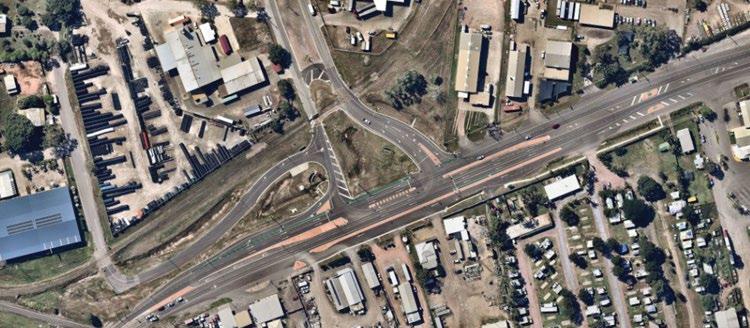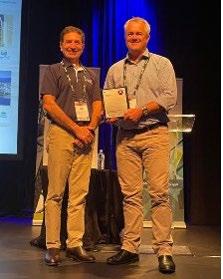
3 minute read
Member Profile, Amelia Marshall
EMERGING PROFESSIONAL
AMELIA MARSHALL
Amelia is a professional civil engineer with extensive civil construction and project management experience for the local government and the private sector. Amelia gained Engineers Australia Chartered Professional and RPEQ status following seven years of construction and project management experience. She has since branched out to expand her skillset in public works engineering asset management, design management, infrastructure planning and technical engineering solution development.
What inspired you to study engineering and civil in particular?
I was born and raised in Townsville and I’ve always loved watching my city grow. I wanted to utilise my aptitude in maths and physics to contribute to the safety, sustainable growth, and liveability of Townsville. James Cook University Townsville has a brilliant world-renowned Engineering School and so, for me, civil engineering was the obvious decision.
What projects have you been involved with to date?
I have been responsible for the successful delivery of the Transport and Stormwater Renewals Portfolio. Most notably I have managed the construction of the intersection upgrade of William Angliss and Macarthur Drive. I was the project engineer on the Townsville Recreational Boating Park (the largest boating park in the southern hemisphere), Elliot Springs (Access to Development), managed the Shoalmarra Drive and Mount Low Parkway Intersection Upgrade and the design of Dalrymple Road 4-laning. I have also worked on developing TCC’s Asset Management Capability Model and the development of our 10-year capital plan, as well as managing the delivery of the capital design program for Civil and Open Space.
I’ve had various levels of involvement over five years on the multi-staged upgrade of three key intersections on Ingham Road at Everett and Weston Streets, Webb Drive and Enterprise Street in different roles I’ve held. These controlled intersections now provide a significant increase in safety of vehicle operation on Ingham Road. It was fantastic to see all the different inputs required across the organisation and externally come together to deliver the project successfully.
What do you enjoy most about working as an engineer in public works?
I love knowing that the community is at the heart of every engineering decision I make.
What has been your biggest challenge as you began your career and how did/do you overcome them?
Trying to perform a public works engineering role as an awkward and timid female maths nerd posed its challenges almost immediately when one of my first tasks as an engineer was to get behind an asphalt paver with a shovel. However uncomfortable it was at first, continuing to work in construction and not giving up is one of the best things I could have done. I have found that effective communication in engineering is just as important as the actual engineering itself. Instead of avoiding conflict, I always seek to understand and demonstrate that I understand before all else. I am then open with the other complications I am considering and I always try to offer options. This approach has made it easy for me to

Enterprise Street before.

Enterprise Street after.
earn the respect of my peers, stakeholders, and clients.
How has your membership of IPWEAQ been of benefit to you to date and what do you enjoy most about the community?
It is a fantastic community that works together to advance the skills, knowledge, and resources available to engineers in public works. I am regularly grateful for the technical notes, guidelines, and standard drawings available to me with my membership. The webinars and workshops that I have attended are always particularly relevant to public works engineering, making the training so valuable to myself and my colleagues. More recently, I signed up to PW-TV TechTalks sessions which I think are a fantastic idea. I am looking forward to accessing iMPACT (the Native Title Cultural Heritage Assessment Tool developed by IPWEAQ) to assist in Cultural Heritage assessments.
Any other comments you would like to make that will help others developing their careers?
If someone believes in you enough to present a career opportunity to you, don’t be afraid to take it, even if the opportunity doesn’t align with your specialist experience. Public works engineering is a broad skillset in being able to understand the needs of the community and being able to utilise your engineering problemsolving ability to provide solutions to help the community.
You’ll be surprised to find that this skillset can be transferrable across many disciplines and career opportunities with commitment and a positive attitude and provide you with valuable personal life skills. Take the leap!








